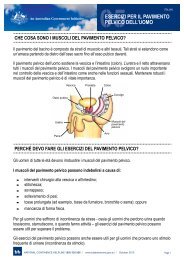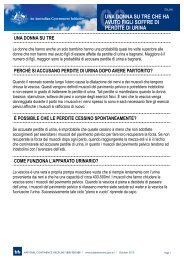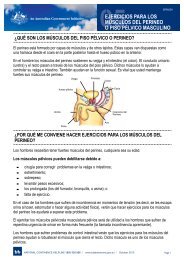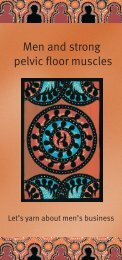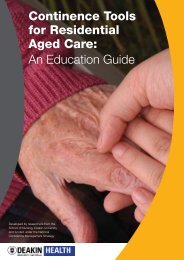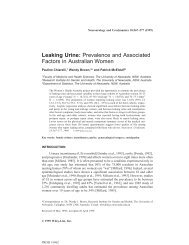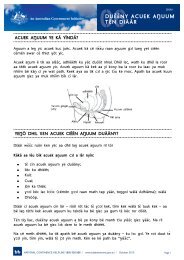Pharmacy Continence Care - Bladder and Bowel Website
Pharmacy Continence Care - Bladder and Bowel Website
Pharmacy Continence Care - Bladder and Bowel Website
You also want an ePaper? Increase the reach of your titles
YUMPU automatically turns print PDFs into web optimized ePapers that Google loves.
Program was based on assessment of health <strong>and</strong> economic outcomes <strong>and</strong> of the<br />
effectiveness <strong>and</strong> cost effectiveness of the overall intervention.<br />
Implementation of the pilot Program involved developing a training package (available from<br />
www.novapolicy.com/pccp) <strong>and</strong> schedule; implementing the first stage of the outcomes <strong>and</strong><br />
effectiveness evaluation through telephone administered interview of all participating<br />
pharmacies; delivery of the training; distribution of a counter-based kit of consumer<br />
recruitment <strong>and</strong> resource materials to all participating pharmacies; follow-up contact with all<br />
participating pharmacies to monitor progress <strong>and</strong> encourage recruitment of customers to the<br />
consumer survey; receipt of 45 customer surveys; exit interview of 32 of the 46 pharmacies<br />
who completed the Program; <strong>and</strong> follow-up computer-assisted telephone interview with 30<br />
of the 45 participating customers.<br />
The outcomes <strong>and</strong> effectiveness evaluation of the pilot Program has demonstrated pharmacy<br />
benefit:<br />
• the <strong>Pharmacy</strong> Survey data indicate unequivocal support for the Program<br />
• there has been a significant increase in the confidence <strong>and</strong> perceived knowledge <strong>and</strong><br />
underst<strong>and</strong>ing of continence issues by pharmacy staff<br />
• there is evidence of changes in pharmacy behaviour after only a brief intervention.<br />
This indicates that the Program has significant potential to become an accepted new<br />
cognitive service within pharmacy practice. This pilot has demonstrated the efficacy of the<br />
training approach <strong>and</strong> materials for pharmacy staff, in that a significant majority reported<br />
increased confidence <strong>and</strong> knowledge of incontinence health issues <strong>and</strong> of the pharmacy<br />
perception of both consumer <strong>and</strong> business benefit.<br />
In respect of consumer benefit, the evaluation strategy did not achieve an adequate rate of<br />
consumer participation <strong>and</strong> it is not possible to assess the PCCP’s effect on the personal<br />
impact of incontinence <strong>and</strong> on health outcomes. On the basis of this project’s experience,<br />
the project team recommend that consumer benefit should be assessed through an<br />
extended study accessing on a routine <strong>and</strong> regular basis consumer feedback from customers<br />
of participating pharmacies. However, the pilot, despite the very small sample of customers,<br />
has indicated that:<br />
• hygiene is the most common area of concern for customers, followed by skin care<br />
• disposable pads (either sanitary or incontinence) are the most commonly utilised product<br />
• expenditure of continence care products (such as non-drug related products, skin care<br />
products <strong>and</strong> women’s sanitary products) is most commonly under $10 per week or<br />
between $10-$25 per week<br />
• brochures/pamphlets provided by pharmacies are the most recalled information source<br />
• people with incontinence, <strong>and</strong> those caring for people with incontinence, are generally<br />
not embarrassed to speak with pharmacy staff about incontinence<br />
• for the majority, pharmacies are a comfortable place to discuss personal needs.<br />
Six existing st<strong>and</strong>ards within the core st<strong>and</strong>ards for the Quality <strong>Care</strong> <strong>Pharmacy</strong> Practice<br />
program are particularly relevant <strong>and</strong> appropriate to the PCCP <strong>and</strong> would enable participants<br />
completing the training <strong>and</strong> implementation of the PCCP, as a component within the QCPP<br />
program, to meet the requirements for provision of CQI points.<br />
The <strong>Pharmacy</strong> <strong>Continence</strong> <strong>Care</strong> Program pilot has provided sufficient evidence to indicate<br />
that implementation of the Program in the longer term would be sustainable through<br />
demonstrated benefit to pharmacy practice in primary health care <strong>and</strong> to pharmacy business.<br />
Final Report x NOVA Public Policy<br />
<strong>Pharmacy</strong> <strong>Continence</strong> <strong>Care</strong> Project



